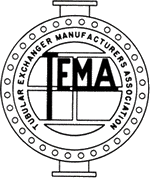 |
Heat Exchangers |
Heat Transfer is one of the most important industrial processes. Throughout any industrial facility, heat must be added, removed, or moved from one process stream to another. There are three basic types of Heat Transfer.. conduction, convection and radiation. The two most common forms encountered in the chemical processing industry are conduction and convection. To transfer heat from one process to another, Heat Exchangers are used.
What are Heat Exchangers?
A Heat Exchanger is a device built for efficient Heat Transfer from one medium to another. The medium may be separated by a solid wall, so that they never mix, or they may be in direct contact. They are widely used in space heating, refrigeration, air conditioning, power plants, chemical plants, petrochemical plants, petroleum refineries, and natural gas processing. One common example of a Heat Exchanger is the radiator in a car, in which the heat Reference(s), being a hot engine-cooling fluid, water, transfers heat to air flowing through the radiator (i.e. the Heat Transfer medium).
Heat Exchangers come in so many shapes, sizes, makes, and models, they are categorized common characteristics. One common characteristic that can be used to categorize them is the direction of flow the two fluids have relative to each other.
The three categories are parallel flow, counter flow and cross flow.
- Parallel flow exists when both the tube side fluid and the shell side fluid flow in the same direction.
- Counter flow exists when the two fluids flow in opposite directions. Each of the fluids enters the Heat Exchanger at opposite ends.
- Cross flow exists when one fluid flows perpendicular to the second fluid; that is, one fluid flows through tubes and the second fluid passes around the tubes at 90° angle.
The most common types of Heat Exchangers are plate and shell-tube types. Others are Regenerative Heat Exchangers, Adiabatic wheel Heat Exchangers, Plate fin Heat Exchangers, Fluid Heat Exchangers, Waste heat recovery units and Dynamic scraped surface Heat Exchangers.
On this website the "TEMA" Shell and Tube Heat Exchanger wil be discussed.
TEMA
following text comes from TEMA on 25 January 2010
The Tubular Exchanger Manufacturers Association, Inc. (TEMA) is trade association of leading manufacturers of shell and tube Heat Exchangers, who have pioneered the research and development of Heat Exchangers for over sixty years.
The TEMA Standards and software have achieved worldwide acceptance as the authority on shell and tube Heat Exchanger mechanical design.
TEMA is a progressive organization with an eye towards the future. Members are market-aware and actively involved, meeting several times a year to discuss current trends in design and manufacturing.
The internal organization includes various subdivisions committed to solving technical problems and improving equipment performance. This cooperative technical effort creates an extensive network for problem-solving, adding value from design to fabrication.
Whether having a Heat Exchanger designed, fabricated or repaired, you can count on TEMA members to provide the most current, efficient design and manufacturing solutions.
TEMA is a way of thinking - members are not only researching the latest technology, they're creating it.
Using TEMA members as a resource(s) today ensures a reliable partners for years to come.
